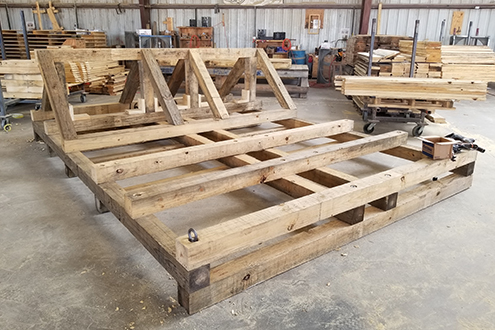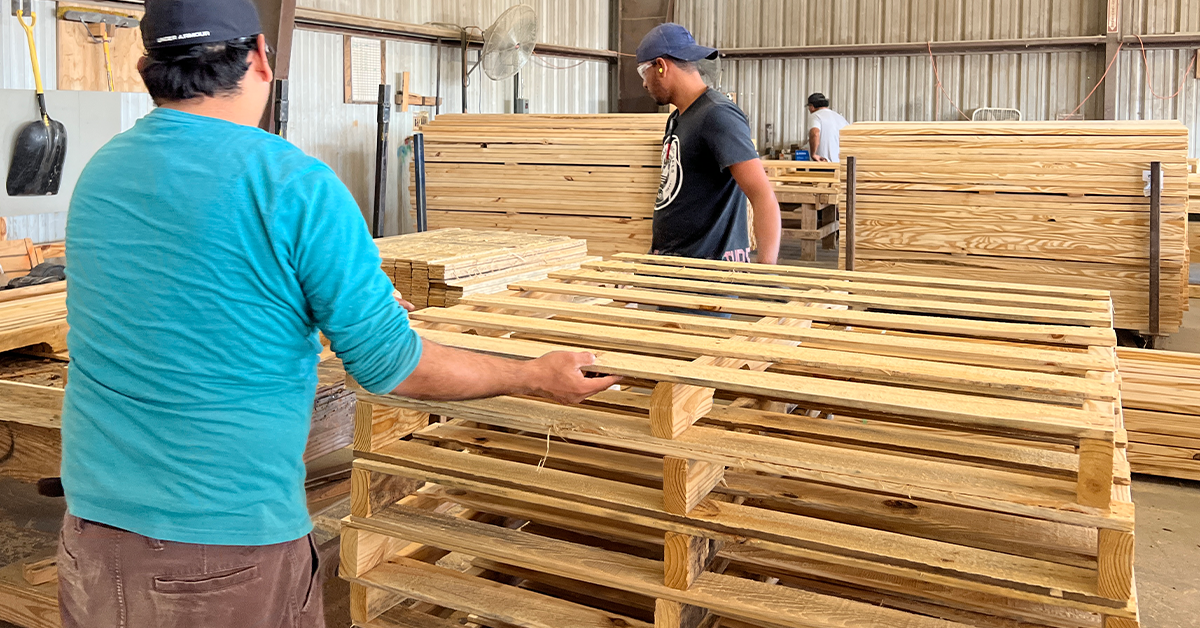Shipping pallets are one of the most important components needed to participate in manufacturing in just about every industry. Getting products to their destination, without damage, is a primary concern and pallets help make that happen. Pallets come in a standard size (48” x 40”) or can be made custom to fit specific needs. One thing that they all have in common is that there are notches and space for forklifts to be able to lift and maneuver the pallets.
There are many benefits of using shipping pallets when transporting your inventory. Pallets help make sure that products are moved safely and securely. A shipment may be loaded and unloaded multiple times, so keeping pallets stacked securely can save a lot of time and money while preventing potential damage. Additionally, they speed up transit times because of the increased efficiency that using shipping pallets provides. In this article, we will discuss the differences between types of shipping pallets and help you to understand what would be best for your current manufacturing process.
Wood vs. Plastic
The first decision that needs to be made when looking into shipping pallets, is whether to go with wood or plastic. It is estimated that 90-95% of shipping pallets used today are made from wood, but there are pros and cons to both. Depending on your unique needs, will determine what type of shipping pallets to use.
The number one advantage of plastic pallets is their cleanliness, which is why they are often chosen for the food and pharmaceutical industries. They can easily be washed, sterilized, and reused for a longer shelf-life than wood offers. The downside to plastic shipping pallets is that they are much more expensive than wooden pallets, cannot be easily fixed if broken, hard to get in custom sizes, and don’t hold as much weight. Getting pallets back is not always a guarantee, so plastic shipping pallets can quickly become the more expensive choice.
As stated above, wooden shipping pallets are the most common choice across industries. They are considerably less expensive than other options and are easier to repair. Wood shipping pallets also hold much more weight, so if you need the capability to move heavy equipment, wood pallets are the way to go. They can be reused and completely recycled, which makes them the more sustainable of the options as well.
New vs. Recycled
Next, deciding between new and recycled pallets can be confusing. Can recycled pallets hold up the same way new ones can? Is the price difference worth it? Once again, it depends on your unique manufacturing needs.
Recycled shipping pallets are the cheaper option of the two, but that is one of the only pros of using them. Recycled pallets cannot be relied upon for consistent quality and are more likely to have a pallet failure incident. Cracks and other issues can be hidden from sight which affects the integrity of the pallet. Recycled shipping pallets are harder and more expensive to get in custom sizes and configurations.
With new shipping pallets, they will most likely be purchased in a batch from the same supplier. This helps to keep the consistency of quality, strength, and cleanliness. There is a lot less to worry about when you invest in new pallets. Additionally, there is no need to force standard-sized pallets to work, new pallets can be built to meet your specific measurements.
Custom Shipping Pallets
Custom shipping pallets are built with your manufacturing needs and processes in mind. This is a tailored approach that will allow engineers and designers to make a pallet that meets the requirements of your products based on your respective supply chain and logistic demands. Working with a supplier that prioritizes cost-effective and secure custom pallets can benefit you in the long run.

Export Shipping Pallets
If you are shipping any products outside of the United States, there is a chance that all wood packaging will have to be ISPM-15 stamped. You do not want to deal with the headache of products being held up in customs in a different country. It can take weeks or even months to get products returned, if at all.
ISPM-15 is a set of guidelines for regulating wood packaging materials that are traded internationally. There are more than 180 countries that currently have adopted these regulations, which means you will need to if you plan to export your products.
ISPM-15 is a type of sterilization that is done to wood and wood packaging with a thickness greater than 6mm. The wood can be heat treated or fumigated to prevent the spread of pests and bacteria. For heat treatment, the wood must be heated until the core temperature reaches 133 degrees Fahrenheit for a minimum of 30 minutes. The fumigation process is done by placing wood into a chamber and filling it with Methyl Bromide.
For export shipping pallets, check to make sure that your lumber or pallet supplier is certified to give out the ISPM-15 stamps before placing an order.
Reliable, Dependable…. Close By?
Shipping pallets are an integral part of the manufacturing process and quite literally keep production lines moving. Partnering with a dependable pallet supplier is non-negotiable. Choosing the correct pallet supplier is almost as important as the type of shipping pallets you use. You must trust that shipments will be made on time, that quality stays consistent, and that your efficiency is a priority for them.
But what about the location? Yes, the location of your pallet supplier is important as well. There may be times when emergencies happen, and you may need a boost in supply outside of your normal orders. It is easier for a pallet supplier to help with these issues quickly when they are located closer to you.
Transportation also affects the overall cost of materials. The longer the pallet takes to get to you, the more it costs. You can get caught with quite a bit of transit cost if your shipping pallets are being delivered from far away. Look for local suppliers when choosing who to buy your shipping pallets from.
Conner Can Help
Conner has been an industry leader in wood packaging solutions for more than 40 years. We specialize in supplying cut lumber, pallet, crates, skid parts, custom pallets, and engineered packaging solutions to various manufacturing sectors. We serve customers nationwide from our 14 plant locations, which helps keep us local to you and your needs. Reach out to us today to see how we can help you get the shipping pallets you need.



![[PRESS RELEASE] Conner Industries Announces Major Guardian Packaging Expansion](https://conner.b-cdn.net/wp-content/uploads/2024/10/Guardian-Packaging-Expansion-500x383.jpg)
![[PRESS RELEASE] Conner Industries Announces Website Dedicated to Integrated Packaging Division](https://conner.b-cdn.net/wp-content/uploads/2024/05/Conner-Packaging-Blog-500x383.jpg)


